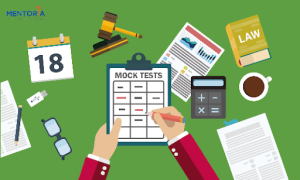Things You Need to Know for CLAT Exam

If you are someone who is interested in law then we are sure you are preparing for CLAT. If yes, you need to know certain essential things that will help you prepare. This article will discuss the essential tips, techniques and other aspects you must keep in mind while preparing for the CLAT exam. It will also explain how to use available resources and how to plan your study schedule so that you can succeed in the exam. So if you are planning on appearing for a CLAT exam, make sure that you keep reading!
What Is CLAT And How Do I Start Preparing?
The Common Law Admission Test (CLAT) is an entrance exam conducted by various Indian law universities to select students for undergraduate and postgraduate law programs. So if you are an aspiring lawyer looking forward to pursuing your dreams and gaining admission into some of the top law schools in India, then this is your best bet!
150 comprehension-based multiple-choice questions (MCQs) from five subjects—English Language, General Awareness, Current Legal Reasoning, Quantitative Techniques, and Logical Reasoning—make up the CLAT exam paper for UG courses.
This is a top national law entrance test for admission to 22 National Law Universities (NLU) in India. There is no specified minimum age requirement to take the CLAT exam. The application form is available on the Consortium of National Law University’s official website, consortiumofnlus.ac.in.
The CLAT exam will be administered offline. It is an objective paper with a two-hour time limit. One mark will be given for each correct response, and 0.25 will be taken off for each incorrect response. Only English will be used to administer the test. The exam is conducted annually by a different National Law University each year and is typically held in the month of May.
To obtain a law degree from an NLU, or the top institution for law in India, high CLAT scores are absolutely required. It is never too early to devise a rational and practical preparation strategy for CLAT. Let’s see how you can get started!
1. Know your marking scheme
It is pretty important for you to be familiar with the grading scale for CLAT. You should understand which section will help you score the points required to clear the CLAT exam. The maximum score is 200, and the minimum score required to qualify for the merit list is usually around 120-130. Here is the section-wise division of the same.
- English Language: Candidates will be required to respond to inquiries about the paragraph. You will be given comprehension passages from recent or influential fiction and non-fiction works, each around 450 words long. To prepare for the CLAT in English, read the editorials and opinion columns in the newspaper. The English used in newspaper editorials and opinion pieces is sufficient to help you with your language skills. For language and vocabulary improvement, read, and I mean read a ton of books, periodicals, newspapers, and novels! Thank me later for the nudging.
- Quantitative Techniques: Short lists of assertions or facts, graphs, or other written, visual, or diagrammatic representations of numerical data will be presented in this part, followed by a string of questions. Since the questions are intended to test you on simple mathematics, or the fundamental arithmetic you learnt until class 10, mathematics may be a minor concern for law aspirants. It is sufficient to read the NCERT Mathematics textbooks for classes 9 and 10. It sure must be nostalgia when you open up those dusty old school books for an exam that you want to make a career out of, but it’s just a matter of time. So yeah, know the relevant subjects and understand each idea completely.
- Logical Reasoning: This part will consist of several brief paragraphs, each of about 300 words. Logical Reasoning candidates must recognise patterns, logic, and arguments, and then respond appropriately. Focus more on blood relationships, directions, number series, drawing conclusions, etc., and make sure your notions are clear and that you understand the underlying principles of the topics covered in the syllabus. Study and solve verbal and nonverbal reasoning problems.
- Legal Reasoning: Candidates must read passages that average 450 words each for this test. The texts may be based on actual events or hypothetical situations concerning law, politics, or moral philosophy. The most significant component of the CLAT test is still legal aptitude. Your capacity to resolve legal problems will be tested by the questions in the legal aptitude section. The Legal Penal Code and the Indian Constitution are important books to consult for this. Consult books like “Legal Glossary Terms” and “Most Commonly Used Legal Terms.” It is also beneficial to read legal periodicals in order to gain a more legal perspective on problems or a more legal view on important matters.
- Current Affairs including General Knowledge: Yep, there’s GK too. Candidates must respond to questions based on passages of up to 450 words each that are connected to current events and general knowledge. The excerpts will be taken from non-fiction writing, journalism, and news sources. Basic familiarity with history, geography, and science will be highly valued. Making it a habit to read the newspaper every day is among the greatest CLAT GK preparation advice. Do not cram occasions or dates. Instead, consider the reasons behind what occurred. Get a sense of these issues.
2. Increase Your Conceptual Understanding
You’ll need to have a solid conceptual grasp to succeed on a test as difficult as CLAT. To build a firm understanding of the concepts questioned in the CLAT, review your fundamentals and key ideas frequently. Writing the practice test the very same day that the principles are understood is crucial for concept reinforcing. Your conceptual knowledge will be improved, and you’ll be able to identify your areas of weakness.
3. Have A Plan And Know Your Resources
Candidates must have an organised month-by-month study plan to get ready for the CLAT. The top CLAT preparation books should therefore be available for candidates to use. Candidates should also have a collection of CLAT test questions from earlier years. You can learn about the format of the CLAT exam and learn about your strengths and weaknesses by taking practise exams. There are plenty of books for CLAT preparation accessible on the market. The Consortium also releases a variety of UG-CLAT preparation materials, such as model question papers, guides to the exam, sample questions, and instructional materials and exercises.
List of some books:
- “CLAT Common Law Admission Test” by Arihant Experts
- “CLAT Entrance Exam” by GKP
- “CLAT & LL.B. Entrance Examination” by RPH Editorial Board
- “Common Law Admission Test (CLAT) Unlocked” by Disha Experts
List of some online resources:
There might be other materials out there; this is not a complete list. It’s critical to conduct research and identify the resources that best meet your goals and learning style.
4. Time Management is A Must
As a wannabe future Lawyer, it’s indeed crucial to efficiently manage your time because the CLAT exam has a time limit (and so will the court cases you take up in the future!). To enhance your time management abilities, practise taking these exams and timed quizzes so you can pick up the pace during the actual exam. When studying, set a timer and stay on task during that period. You can stay on task and prevent procrastination by doing this. By taking regular pauses, you can maintain your concentration and prevent burnout.
The World Of Law Awaits You. Get #CareerReady Now!
According to the candidate’s performance on the CLAT exam, the merit list is created. The NLUs are subsequently allocated to the candidates using the merit list. According to the merit list and the candidates’ preferences listed on the CLAT application form, the NLUs are assigned to the candidates. With the right approach, you can increase your chances of success. The CLAT examination is more than just getting a good score, it’s about understanding the legal system and being prepared for the challenges of law school. If you need any help with your career journey, we are here for you!
Sign Up for Mentoria – India’s Most Reliable Career Discovery Platform. Mentoria promises to handhold you throughout your career discovery journey – from the time you sign up until you get into a career you love.










